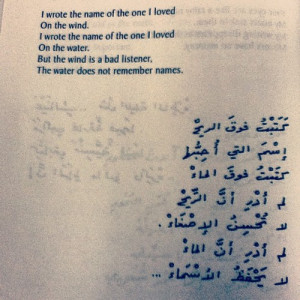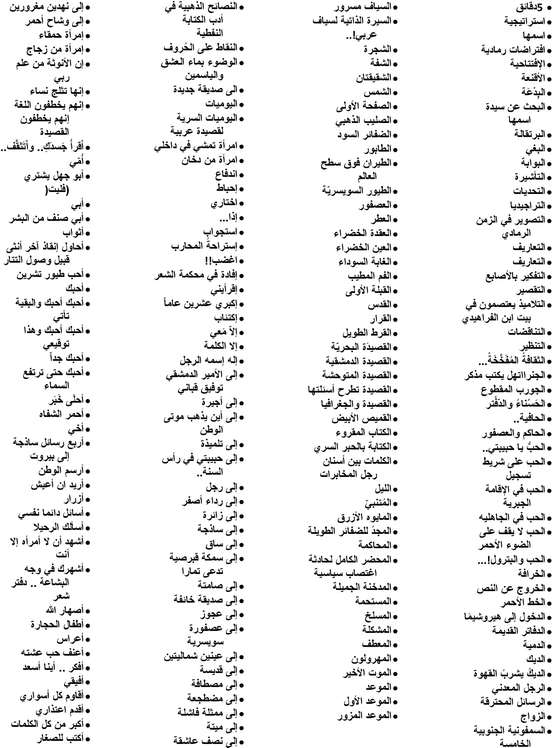Feb 14, 2011 The Syrian poet Nizar Qabbani (1923-1998) was one of the most popular Arabic-language poets of the twentieth century, well-known for his focus on eroticism and love. As Bassam Frangieh notes in his introduction to Arabian Love Poems, a collection of Qabbani's work he co-translated with Clementina Brown, 'To say that Kabbani was the most popular. Qabbani was definitely a genius- his Arabic poetry so piercing and straightforward, and yet profound with meaning and emotions with charming, sensual imagery. As I Published posthumously, this book is a collection of Qabbani's love poems, with its pages split in two- one side of the pages had Nizar's original poetry in Arabic, and on the. Nizar Kabbani’s poetry has been described as 'more powerful than all the Arab regimes put together' (Lebanese Daily Star). Reflecting on his death in 1998, Sulhi Al-Wadi wrote (in Tishreen), 'Qabbani is like water, bread, and the sun in every Arab heart and house. In his poetry the harmony of the heart, and in his blood the melody of love.' Feb 22, 2019 Arabian Love Poems. Full Arabic And English Texts (Three Continents Press) PDF. Nizar Qabbani نزار قباني Native name نزار قباني Born ( 1923-03-21)21 March 1923, Died 30 April 1998 ( 1998-04-30) (aged 75), United Kingdom Occupation Diplomat, poet, writer, publisher Nationality Website Nizar Tawfiq Qabbani (: نزار. Qabbani was definitely a genius- his Arabic poetry so piercing and straightforward, and yet profound with meaning and emotions with charming, sensual imagery. As I w Published posthumously, this book is a collection of Qabbani's love poems, with its pages split in two- one side of the pages had Nizar's original poetry in Arabic, and on the.
Granada: A Poem by Nizar Qabbani
A figure by a pool at the Alhambra by Henry Stanier
Granada by Nizar Qabbani
Translated by Habeeb Salloum/Contributing Writer
After touring the Alhambra Palace in Granada with a beautiful Andalusian guide, the Syrian poet Nizar Qabbani wrote:
At the entrance of Alhambra was our meeting,
How sweet is a rendezvous not thought of before.
Two soft black eyes in perfect frames enticing,
Generating after-effects from the past ages afore.
Are you a Spaniard? I asked her enquiring,
She said: Granada is the city where I was bore.
Granada! Seven centuries awoke from slumbering,
In her eyes, after the clothing of sleep they wore.
And Umayyad, with flags lifted high, flying,
Their horses streaming by, unnumbered they pour.
How strange is history, how is it to me returning?
A beautiful granddaughter, from my pedigree of yore.
With a Damascene face, through it I was seeing,
The eyelids of Sheba and the neck of Sucad once more.
I saw a room in our old house with a clearing,
Where mother used to spread my cushions on the floor.
And the Jasmine inlaid in its stars were shining,
With the golden singing pool, a picture of splendour.
Damascus, where is it? I said: you will be seeing
It in your flowing hair, a river of golden black ore.
In your Arab face, in your mouth still storing
The suns of my country from the days of Arab lore.
In the perfume of Generalife with waters gleaming,
Its Arabian Jasmine, its sweet basil and citron odour.
She came with me and her hair behind her flowing,
Like luscious ears of grain in an unharvested meadow.
The long earrings on her neck were glittering,
Like Christmas Eve candles that sparkle and glow.
Behind her like a child I walked, she was guiding,
And behind me, history, piles of ashes row after row.
The decoration of Alhambra I almost hear pulsing,
And the ornaments on the roof, I hear their call grow.
She said: Alhambra! Pride of my ancestors glowing,
Read on its walls my glories that shine and show.
Her glory! I anointed an open wound festering,
And in my heart anointed another that refused to go.
If only my lovely granddaughter had a way of knowing,
The ones she meant were my ancestors of long, long ago.
When I bid her adieu, when I knew I was going,
I embraced in her Ṭāriq ibn Ziyād, that Arab hero.
Alhambra of Granada
Alhambra of Granada
A ceiling in Alhambra Can you shoot crack with kool aid.

Alhambra of Granada
Alhambra of Granada
Alhambra of Granada
Related content
Picturesque Carmona Offers Its Charm and History
Oct 21, 2020
The Hidden Spanish Resort of Gandia
Sep 2, 2020
Arabian Love Poems Nizar Qabbani Pdf Writers
Granada and The Alhambra - Spanish Language Workshop
Feb 22, 2021

The Aura of Charles V and Philip II Saturates the Cities of Tordesillas and Valladolid
Jul 15, 2020
How Kazem Al Saher Incorporated Nizar Qabbani's Poetry into Arabic Music
By: Ala Abed-Rabbo/Arab America Contributing Writer
If you study Arabic or are an Arab, chances are, you know who Nizar Qabbani is. The famous poet is known for his poems about love. Although Qabbani has passed away, his poetry is still famous, with many people paying tributes to his legacy. One of these people is Kazem Al Sahir, who puts Qabbani’s poetry into his music.
Who is/was Kazem Al Sahir and Nizar Tawfiq Qabbani
How did Kazem Al Saher incorporate Nizar Qabbani’s poetry into modern Arabic music? Born on September 12, 1957, Kadim Jabbar Al Samarai, also known by his stage name Kazem Al Saher, is an Iraqi singer, songwriter, and composer. In the Arab world’s history, he has become one of the most well-known singers.
Kazem Al Saher is an Arab legend. More than 100 million albums were sold throughout his thirty-plus years’ career. Also, he has performed live for millions of people around the world. Kazem grew up driven by enthusiasm for creativity. After exploring numerous forms of art, including molding, painting, sketching, fashion, poetry, and more, he opted to focus on music.
Moreover, born on March 21, 1923, Nizar Tawfiq Qabbani, was a Syrian poet, diplomat, and publisher. His poetic style mixes simplicity and grace in defining themes of Arab patriotism, love, feminism, and religion.
In the Arab world, Nizar is one of the most significant, ongoing, passionate, and famous love poets. He is known as the writer of woman, romance and flirting. Many of his poems expressed the issues of women’s liberty.
Kazem Al Saher’s Beginning Journey
Nizar Qabbani Poetry
“Before he died in 1998, famed Syrian poet Nizar Qabbani said of Iraqi singer and composer Kazem al-Saher, ‘I finally found a person who can hug my poems.'” Al Saher, in 1989, released a song called ‘Obart Al Shat,’ (I Crossed the Ocean). It was his breakthrough song. After his remarkable performance of this song, included in the album, he left for Kuwait and then to Beirut, Lebanon.
During Al-Saher’s stay in Beirut, he worked with Nizar Qabbani, and many of his songs are in Modern Standard Arabic and Classical Arabic. Al Saher incorporated various of Qabbani’s poems and composed them into songs. Nizar wrote ‘Zidini Ishkan,’ (Love me Even More) for Kazem to perform.
During the 1970s, were some of Qabbani’s most extremely controversial pieces that included Qasa’id Mutawahishe (Riotous Poems), and Ash’ar Kharija An al-Qanun (Antisocial Poems). Lg network storage pc software installer download. One of his most-selling poems, Ashadu an la Imraatan Illa Ante, that translates to “I Swear That There is no Woman but You”, was performed by Al Saher.
Nizar Qabbani Book
Al Saher’s Music Inspirations
Al Saher often draws his muse in music from Qabbani’s poetry, as both worked together. Qabbani gave parts his poetry sets to Al Sahir. Some songs that integrate Al Qabbani’s poetry incorporate ‘Madrasat Al Hob,’ (The School of Love) and ‘El Hob El Mostaheel,’ (The Impossible Love).
According to Al Saher, Nizar Qabbani was one of the critical poetic writers who influenced him when he was a child. When he was at the age of 14, he recalls reading his poems joyfully. Kazem’s pieces of work re-defined Arabic music through his compositions of Arabic poetry, notably that of famous Syrian romantic poet Nizar Qabbani who named him “The Caesar of Arabic music.”
Kazem Al Saher Mixes Nizar Qabbani’s Poetry
For more than twenty years, the blend work of Nizar and Kazem is ongoing. One of the winning songs, “Eid al Ashaq,” (Valentine Day), combined the lyrics by Qabbani and performance by Al Saher and Arabic music today.
Moreover, Qabbani admired by generations of Arabs for his love-themed poetry. His work presented in the two dozen volumes of poetry but also in lyrics sung by Al Saher, who helped enlighten his masterpieces.
Nizar Qabbani’s Work Always Remembered
Qabbani’s poems of the old tradition of Arabic love poetry continue with popularity until this day. The verses modernized with contemporary experience and echo the rhythms, pitches, and expressions of everyday language. His theme of romantic poems is the main source of hope that the people can surpass pain and fear and provoke to defend their competence towards summon happiness and engage passion.
Also, his poems brought freedom from conflict, liberty from despair, an uplifting delivery of laughter and joy. Such expressions proudly assert a new devotion for the body. It sweeps away the traditional shame of a woman’s physical desire.
Al Saher’s Album Release
Kazem Al Saher launched an album under the name “Raw’e Nizar Qabbani” (Nizar Qabbani’s Masterpieces). Eleven songs are in the collection that was formerly presented by Saher for the poet Qabbani, which include: Zidini Ishqan, Enni Ouhibouki, Ahebiny Bela Oqaden, Taqolin al-Hawa, Fi Madrasat-al-Hob, al-Rasmo bel Kalimat, Hal Endaky Shakk, Ila Telmiza, Sabahoki Sokkar, Taharaky, and Habibaty.
Qabbani, known as one of the Arab World’s best-enlightened poets. His language flowed brilliantly in free verse style and frequently captured the rhythms of everyday Syrian dialects. Many Arabic songs incorporate his lyrics. Among the most recognized Arab singers, have commemorated his best poems. Thus, impacting in promoting his poetry on even a much broader scale.
Check out Arab America’s blog here!
Related content
Celebrating Syria Film Programme
Dec 2, 2020

Nizar Qabbani Quotes
Cartooning Syria Live: a Panel Discussion
Dec 6, 2020
Syrians in the Diaspora: A conversation with Syrian-American Food Writer
Dec 9, 2020
FOR SAMA (2019) - Online Screening plus Live Q&A with Afraa Hashem
Dec 10, 2020
Exploring the Nabatean/Roman Ruins in Southern Syria
Nizar Qabbani Words
Nov 11, 2020